With 2.4 million people locked up in the United States, prisons are big business, and not just for the private companies that operate them. The Center for Public Integrity has a multi-part look out today on the business scheme to make inmates and those newly released from prison pay to access their own money.
The report focuses on JPay, a prisoner financial services company which sells debit cards and money transfer services to inmates and their families. Amirah Al Idrus reports for the Center for Public Integrity:
In Michigan, for example, JPay charges users 50 cents to check the card’s balance at an ATM, $2 to withdraw cash, 70 cents to make a purchase and 50 cents a month for a maintenance fee. Even not using the card costs money. Doing nothing draws a $2.99 fee after 60 days. To cancel the card, it costs $9.95.
In a companion article, Center for Public Integrity reporter Daniel Wagner writes that families have few alternatives but to submit to this fee-filled world.
Inmates’ need for money is inescapable, Nelson says. Those in northern Illinois are not issued cold-weather clothes, he says, leaving them vulnerable to frostbite unless they can get money to pay for prison-approved long underwear and boots.
…
Taken together, JPay and other prison vendors create a system in which families are paying to send the money, and inmates are paying again to spend it, says Keith Miller, who is serving 21 ½ years at Bland for a series of drug-related, violent crimes committed in his early 20s. The earliest he may be released is 2021, when his mother will be 87 years old.
"The fact that [my mother] has to pay the fees to send the money and then the fact that [prison agencies] make a certain cut off it seems to me that [the prisons are] double-dipping into the money they’re sending," he said in an interview at the prison. "It really doesn’t make sense to me that this should be allowed."
CPI will release the second half of its report on Thursday. Read the rest at the Center on Public Integrity.
